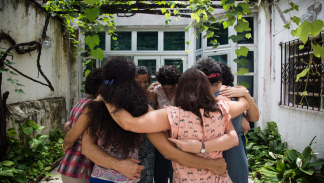U.S.'s Extreme Anti-Abortion Policies Put Women’s Lives at Risk – in the U.S. and Around the Globe
We condemn Alabama’s recently passed abortion ban threatening the health and lives of women. The ban applies even in cases of rape and incest and puts doctors at risk of imprisonment for up to 99 years for trying to help women.
States across the U.S. are passing the most restrictive abortion laws in decades. Georgia, Ohio, and Mississippi recently passed legislation making abortion illegal past six weeks into pregnancy, a time when the vast majority of women are not aware they are pregnant. Bans similar to Alabama’s have been introduced in other state legislatures and seven US states have passed bills this year that narrow the window for abortion. Many legal observers predict these bans will set up court battles meant to overturn Roe v. Wade.
This dangerous trend puts women’s lives at risk.
The US has been exporting anti-choice measures as well. The Trump administration recently expanded the global gag rule which prohibits any organization from receiving funding from the U.S. government if they provide services, referrals, and advocacy related to abortion – even with non-U.S. government financing. As a result, millions of women worldwide will be shut off from comprehensive sexual and reproductive health information and services.
“This is much bigger than abortion,” said Musimbi Kanyoro, President and CEO of Global Fund for Women. “The global gag rule affects family planning, maternal health, HIV prevention and services, the LGBTIQ community, sex education for young people—it affects the whole of women’s health care around the world. Expanding this policy directly targets the world’s women and girls, and rolls back reproductive health and rights globally.”
Limitations to abortion rights in the U.S. or anywhere in the globe restrict women’s fundamental self-determination and control over their bodies, lives, and destinies.
We know that lack of accessibility to abortion does not reduce the number of abortions. In fact, the rates of unsafe abortion are highest where there are the most restrictions. According to recent estimates, at least 8% of maternal deaths worldwide are from unsafe abortion; at least 22,800 women die each year from complications of unsafe abortion. In 2014, the annual cost of providing post-abortion care from unsafe abortions in developing countries was US$232 million.
Anti-abortion laws have powerful and negative economic consequences. Women in the U.S. who want an abortion, but are denied one, are more likely to spend years living in poverty than women with abortion access.
This public health crisis is 100% avoidable.
Across the world, women are fighting with creativity, resilience, and determination for their sexual and reproductive health and rights. Global Fund for Women wholeheartedly supports these movements.
“It is appalling that in the 21st century we are still battling efforts to criminalize abortion which is an integral part of women’s health and rights,” said Leila Hessini, Vice President of Programs. “As a global fund, we are inspired by the activists and organizations in the U.S. and across the globe that are working to dismantle sexism and ensure that all women have control and power over their sexual and reproductive lives.”


